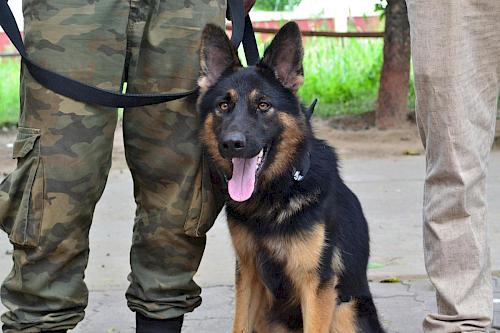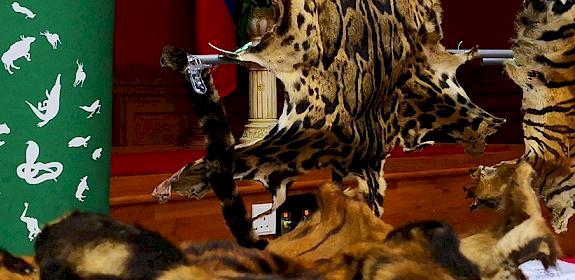India's wildlife super sniffer dog squad expands: Six young dogs begin training
Panchkula, Haryana: India's wildlife sniffer dog force trained under TRAFFIC and WWF-India's programme will soon get six recruits as a new group begins training.

The 10th batch of the programme with six young German Shepherds dogs, ranging between six and nine months old, and their 12 handlers have begun their seven-month course at Basic Training Centre, Indo-Tibetan Border Police Force (BTC-ITBP) camp in Panchkula, Haryana.
On completion of training, the wildlife sniffer dog squads will join the forest departments of Karnataka (4), Bihar (1), and Madhya Pradesh (1), taking the total number of wildlife sniffer dogs trained under TRAFFIC and WWF-India's programme to 94.
The illegal wildlife trade has endangered the existence of many wild species across the globe. In India, it includes an array of wildlife products and derivatives such as mongoose hair, snake skins, rhino horn, tiger and leopard parts, elephant tusks, deer antlers, shahtoosh shawl, pangolin scales, turtle shells, musk pods, bear bile, medicinal plants, timber, parakeets, mynas, munias and much more. Wildlife law enforcement practices are critical in containing this threat, and the use of wildlife sniffer dogs for wildlife crime prevention and detection has been a game changer in India.
Mr Ravi Singh, Secretary General & CEO, WWF-India, said, "Using detection dogs in law enforcement is a proven practice as dogs are competent in combatting crimes of varied nature because of their agility and excellent olfactory senses. TRAFFIC and WWF-India's wildlife sniffer dogs, popularly known as Super Sniffers, play a crucial role in detecting and curbing illegal wildlife trade in India."
With just two wildlife sniffer dog squads in 2008, our programme has successfully trained 88 dogs, and now six more are under training. Twenty-one states have participated in this programme and have deployed trained sniffer dog squads to fight against wildlife crime. The programme has grown to become the largest in the country."
Dr Merwyn Fernandes, Coordinator, TRAFFIC's India officeMr Ishwar Singh Duhan, Inspector General, ITBP, Director, NTCD&A (National Training Centre for Dog & Animals), Panchkula, said, "The training programme for wildlife sniffer dog squads has been carefully designed to accommodate both basic obedience and detection skills specifically for detecting and curbing illegal wildlife trade in India.”
He explained, “The dogs are being trained using the latest training tools to master sniffing and tracking skills for the scent of various wildlife products. Training is being scientifically conducted using modern conditioning techniques, including positive reinforcement through food and play rewards. Also, dogs will be exposed to various real-life search scenarios in populated and forest areas. We are confident that these new wildlife sniffer dogs will continue to help the enforcement officials curb illegal wildlife trade on completion of training."
The training of the 10th batch of six dogs at ITBP started on 5 September 2022. The first few weeks of the training will focus on developing an emotional and trusting bond between the dog and the handler, which is crucial to becoming a successful wildlife sniffer dog. Later, the dogs will learn sniffing and tracking skills and be trained to detect tiger and leopard skins, bones and other body parts, bear bile, red sanders, and other illegal wildlife products.
WWF

WWF is an independent conservation organization, with over 30 million supporters and a global network active in over 100 countries. WWF's mission is to stop the degradation of the Earth's natural environment and to build a future in which humans live in harmony with nature, by conserving the world's biological diversity, ensuring that the use of renewable natural resources is sustainable, and promoting the reduction of pollution and wasteful consumption. Visit www.panda.org/news for the latest news and media resources and follow us on Twitter @WWF_media.




